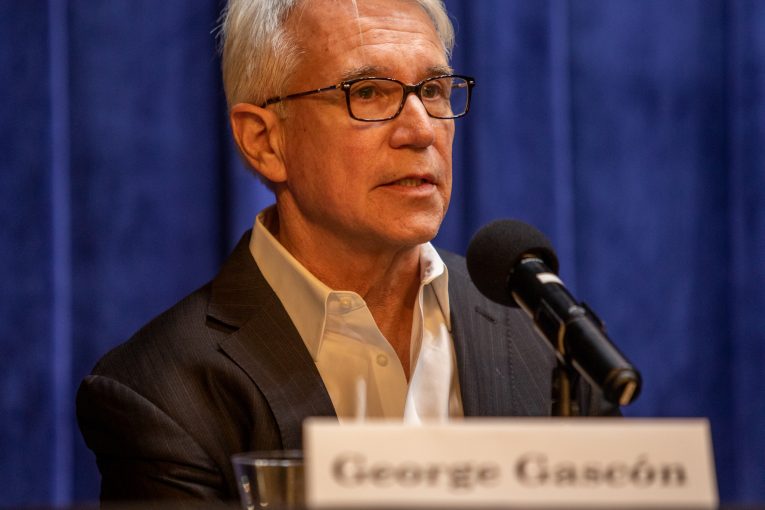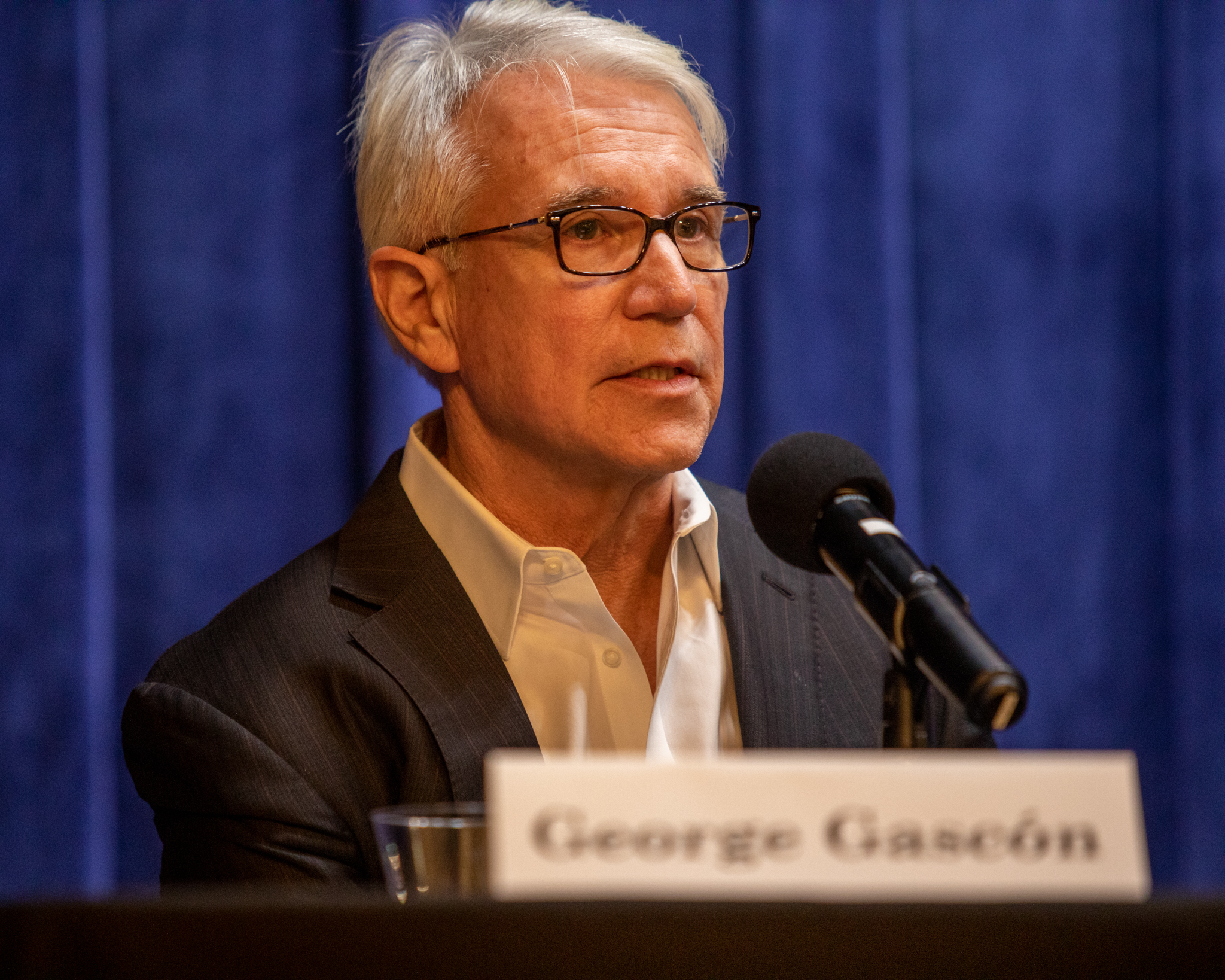

By Özge Terzioğlu
LOS ANGELES—Newly elected District Attorney George Gascón announced his immediate implementation of unprecedented reform to LA County’s policing policies at his inauguration and swearing-in ceremony as LA County’s 43rd District Attorney Monday.
Gascón emphasized the need for sweeping reform instead of incremental changes.
At his swearing in Monday, Gascón announced an end to cash bail, death penalty prosecutions and resentencing people on death row to life in prison and not filing first time misdemeanors for offenses association with property.
Among other policies are ceasing the charging of juveniles as adults, creating a review board that would recommend use of force cases to be reviewed, not requiring victims to testify to receive victim services, and extending victim services to families of people killed by law enforcement.
Gascón recalled his days, 40 years ago, as a police officer. It was this job, he said, where he witnessed “over and over again the multigenerational impact of arrests and prosecutions in poor African American and Latino communities.”
To this day, Gascón remarked that he continues to be haunted by these familiar faces, the faces of multigenerational incarceration.
The new DA Monday discussed how in America, drug addiction is not drawn by racial lines, but incarceration for drug offenses are “anything but equal.” And it starts young. “Disadvantaged kids that get  caught tend to go to juvenile hall, while wealthy kids tend to go to rehab.”
caught tend to go to juvenile hall, while wealthy kids tend to go to rehab.”
He reasoned that locking up children has never enhanced public safety, it only “significantly increases a young person’s likelihood of committing future offenses.”
Because of this, Gascón is immediately ending the practice of charging kids as adults for crime.
Additionally, he claimed that “‘tough on crime’ advocates, private prisons, the bail industry, and law enforcement unions profit off of taking away civil liberties.
He said “they sold us a false narrative that more police, stiffer penalties, and more people locked up in prison make us safer. They continue to make these unfounded, self-serving claims in the name of victims. But, you know what, they failed to ask victims what they actually want.”
After citing a study that found that victims prefer rehabilitation, investments into education, job creation, mental health programs, community, and youth risk programs over investments into jails, Gascón announced that his office “will not falsely invoke victims,” and immediately end cooperation requirements for victims of crimes. Victims will no longer be required to testify to receive victim services.
Because Gascón believes that “Anyone who loses a loved one is a survivor in [his] eyes,” his office will “immediately extend victim services to the families of those killed by law enforcement.”
Gascón remarked upon how the murder of George Floyd “exposed the chasm between police and community.” Furthermore, he identified the justice system as having two tiers: “One for police officers and prosecutors, and one for everyone else.”
To promote accountability within law enforcement, Gascón pledged to “reopen four of dozens of fatal officer-involved shootings for review.”
He is also “convening a use of force review board, made up of policing experts, civil rights attorneys, and community members.” This board “will review use of force cases dating back to at least 2012, and make recommendations to [his] office as to which additional cases need to be reopened.”
Gascón reasoned that “Los Angeles is the poster child for the failed ‘tough on crime’ approach, and we’re already past 300 homicides last month.”
He justified his sweeping reform as necessary because “The status quo hasn’t made us safer.”
Gascón announced more policies, beginning Monday, that are “based on data and science, not fear and emotion. We know that our system of money bail as it is unjust. How much money you have in your bank account is a terrible proxy for dangerousness.”
He identified cash bail as a “serious risk to public safety,” that prohibits the poor from buying their freedom.
Because of this, his office will “no longer request cash bail for any misdemeanor, non-serious, non-violent felony offenses.” He said experts calculated that this policy would allow hundreds of eligible people behind bars to get their freedom back almost immediately.
However, Gascón claimed that’s only the first step.
“By January 1, my office will roll out a plan to eliminate money bail in Los Angeles in its entirety. We will be the largest office in the nation to eliminate cash bail. And then we will reinvigorate the presumption of innocence in LA County.”
Gascón identified enhancements as “outdated, incoherent, and applied unfairly.” He stated that there’s no compelling evidence that enhancements improve public safety.
To criticize the harmful impact of the 3 strikes law, Gascón explained how California has a prison population of 23,000 in 1980. That rose to 94,000 in 1990. But in 1999, after the three strikes law was passed in 1994, California’s prison population “ballooned to 160,000.”
Gascón recognized how the three strikes law and enhancements “severely exacerbated racial disparities in our criminal justice system.”
Because of this, Gascón’s district attorney office will immediately cease filing “all enhancements and three strike allegations” and all deputy district attorneys will dismiss such allegations at their next court appearances.
Gascón reiterated that enhancements and the three strikes law “yield no benefit to public safety. They undermine rehabilitation, increase racial inequality in our justice system, and decimate families and communities. They also crowd jails and prisons, and exacerbate the COVID pandemic behind bars.”
To further his efforts to “correct the injustices of the past,” Gascón announced his office will “begin an unprecedented effort to reevaluate every sentence, thousands of cases. Anyone serving a sentence including an enhancement or three strikes allegation will be eligible for reconsideration. So will anyone who’s served more than 20 years in state prison.
“(We) will prioritize cases for resentencing where people have already served excessive sentences, for people convicted of nonviolent crimes, for those deemed to be low risk for release, for people who have demonstrated records or rehabilitation, for all the prisoners who are especially at risk for COVID-19, and for those sentenced to adult prison as a child.”
People who are eligible for this reevaluation make up about one-fifth of California’s prison population, 20,000 people.
Gascón remarked that this policy will improve sustainable public safety and save California taxpayers billions of dollars.
With regards to the death penalty, Gascón cited studies that proved “race influences who is sentenced to die in this country. There are currently 215 people on California death row in LA County. An astonishing 85 percent of them are People of Color. This makes LA an outlier, even within the state’s flawed system. State sanctioned killings do not deter crime.”
Gascón described the death penalty as ineffective and “does not make us safer, it is racist, it is morally untenable, it’s irreversible and expensive,” which is why “beginning today (Monday) it’s off the table in LA County.” He also committed to resentencing people on death row to life in prison.
Gascón criticized the “tough on crime” era again when he discussed reforms to help citizens affected by poverty and mental health issues.
“We criminalized behavior largely associated with poverty. Loitering, drinking in public, public intoxication, possession of drugs and paraphernalia and more. Turning our public health problems into criminal problems did not serve the public interest, nor has it enhanced our quality of life.”
“You can’t cure mental illness, poverty, or homelessness with a cage,” Gascón said.
Because of this, Gascón’s office will immediately stop filing first time misdemeanor offenses associated with poverty and mental health, with Gascón noting, “We will immediately begin the process of working with police to expand diversion into services at the first point of contact. We simply cannot continue to apply criminal justice solutions to what is a public health problem.”
After announcing these unprecedented reforms for LA County, Gascón asked his fellow Angelitos to “walk with me. I ask you to join me on this journey. We can break the multigenerational cycles of violence, trauma, arrest, and recidivism that has led America to incarcerate more people than any other nation. It is this path, that one day, will prevent our police and our criminal justice system alike from having ever again to arrest and incarcerate the fathers and sons of the same families.”
 Özge Terzioğlu is from San Diego and she is a sophomore at UC Berkeley majoring in Rhetoric and minoring in Turkish.
Özge Terzioğlu is from San Diego and she is a sophomore at UC Berkeley majoring in Rhetoric and minoring in Turkish.
To sign up for our new newsletter – Everyday Injustice – https://tinyurl.com/yyultcf9
Support our work – to become a sustaining at $5 – $10- $25 per month hit the link: